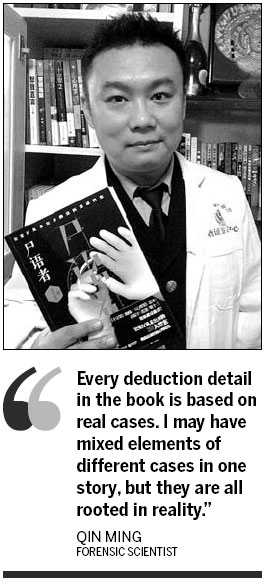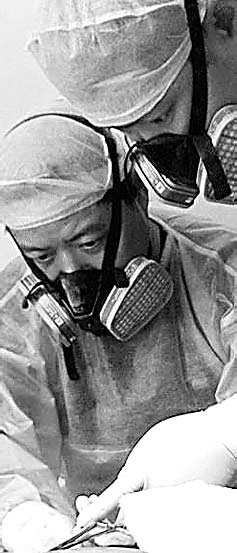Stories from the morgue
Updated: 2012-12-26 07:56
By Pu Zhendong (China Daily)
|
|||||||||||
|
Qin Ming and his colleague work in the morgue doing autopsies. Photos provided to China Daily |
His stories come from daily contact with cadavers, but his empathy with them has inspired his best selling novel. Pu Zhendong talks to forensic scientist Qin Ming.
Qin Ming listens to the dead, and he hears their stories. Now, he has translated the tales into a best-selling crime thriller that has topped China's Amazon and sold about 50,000 copies in just two months.
His debut novel, Voice of the Dead, is a collection of 20 enthralling criminal investigations from his seven years working in forensics. Qin joined the forensics team under Anhui province's public security bureau in 2005 after earning his degrees on forensic medicine at Wannan Medical College in 2003, and the China Criminal Police University in 2005.
In the book, the protagonist takes Qin's name, mostly referred to as Lao Qin in the stories.

White scrubs on and scalpel in hand, Lao Qin spends his days with his colleagues in the morgue or at crime scenes, doing autopsies and searching for the truth.
"Every deduction detail in the book is based on real cases," Qin says. "I may have mixed elements of different cases in one story, but they are all rooted in reality."
The honesty in his writing has earned Qin respect from Jiang Zhenyu, TV celebrity and lecturer at the China University of Political Science and Law. Jiang wrote the preface for Qin's book, saying: "Through these real case stories fused with professional knowledge and investigative wisdom, one sees the righteousness and optimism of the forensic work."
The book first appeared on shop shelves in late September and became an instant hit. It topped the October bestseller list on Amazon China, and the publisher, CS-Booky, says the book will be distributed in Taiwan, and in South Korea soon.
What appeals to readers is that Voice of the Dead is no ordinary thriller.
Zhang Nan, a female reader from Henan province, says: "What fascinates me, apart from the stories, is the author's aversion to crime and injustice."
But experts point out the imperfections about Qin's first novel.
"There is space for a lot of improvement, on the control of narrative rhythm and his exploring of human nature," says Zhu Lili, professor at the School of Journalism and Communication at Nanjing University, Jiangsu province.
"But writing from within the trade represents a segmentation of the cultural industry. I am optimistic about this phenomenon."
Qin's idea for the novel started in February, when he was inspired by a Web celebrity Yu Ying, an attending doctor at the Peking Union Medical College Hospital, who posted her anecdotes at work on Sina Weibo.
"Her weibo posts promote better understanding between doctors and the public," says Qin. "I can write a novel about the daily life of forensics, making this occupation more visible to the society."
After his Spring Festival vacation, Qin plunged into writing with zeal. Every day after work, he would start writing after 9 pm, finishing about 6,000 characters per day and updating 4,000 characters of content on his blog.
"I was surprised to find so many people liking my stories," says Qin. "By the beginning of April, I had already received more than 20 book offers from publishers."
Writing, however, was not an easy part-time job. The former science student encountered enormous challenges in writing, from using the correct words to story structuring and setting the scene for suspense.
His onerous schedule at work often gnawed away his writing time, and all those late nights writing gave him a corneal ulcer.
But every time Qin wanted to give up, he would quote Stephen King, who defines writing as this: "In the end, it's about enriching the lives of those who will read your work, and enriching your own life, as well you can, you should, and if you're brave enough to start, you will."
Supported by such belief and an understanding wife who took "basically all household duties", Qin completed his 220,000-character first draft on May 1.
He started Voice of the Dead with a case that transformed him earlier in his career.
It was July 1999. Qin was a summer intern with the forensic department of Tongling Public Security Bureau in Anhui province. One day, when he opened the body bag for the autopsy, he was shocked to see a familiar face - his schoolmate in primary school.
With the help of senior colleagues, Qin identified the killer through his forensic knowledge.

"Forensic doctors often work under tremendous mental pressure," says Qin. "The deceased might be your friends or colleagues, but no matter how heartbroken you are, you still have to do your duty at the autopsy table."
Apart from writing, Qin is also enthusiastic about making basic forensic knowledge better known on his Weibo page. His professional expertise and humorous expressions have attracted more than 28,000 followers.
In May and August, the world was shocked twice when two Chinese, Lin Jun and Liu Guanghua, were murdered and dismembered in separate cases in Canada.
By August, Qin had responded with an article online, shedding light on the two cases from the forensic perspective.
Voice of the Dead is Qin's first novel, but it definitely will not be his last. His second novel, already in final editing, will come off the press in February 2013. He plans to expand the Voice of the Dead into a trilogy before the end of 2013.
Contact the writer at puzhendong@chinadaily.com.cn.
(China Daily 12/26/2012 page20)
Today's Top News
Rescuers race against time for quake victims
Telecom workers restore links
Coal mine blast kills 18 in Jilin
Intl scholarship puts China on the map
More bird flu patients discharged
Gold loses sheen, but still a safe bet
US 'turns blind eye to human rights'
Telecom workers restore links
Hot Topics
Lunar probe , China growth forecasts, Emission rules get tougher, China seen through 'colored lens', International board,
Editor's Picks

|

|

|

|

|

|






